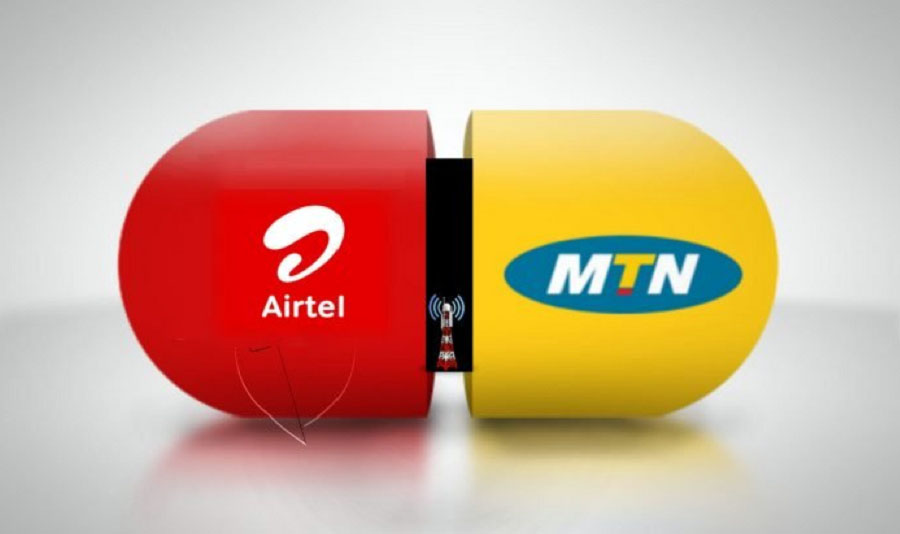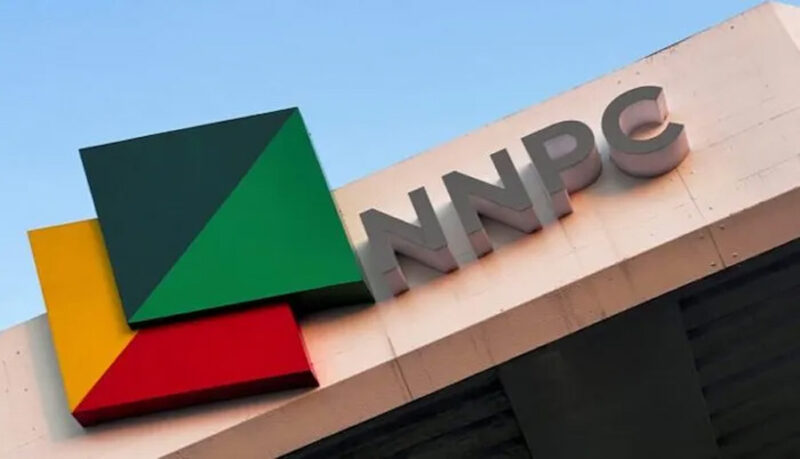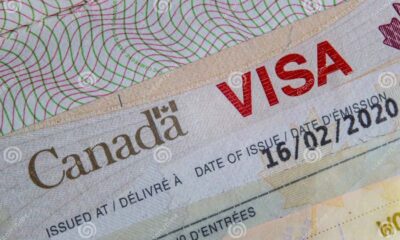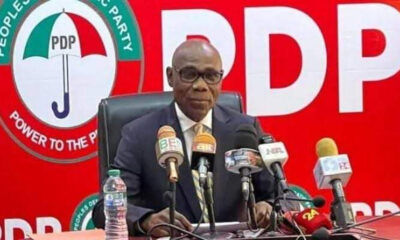Business
AfDB boss laments poverty in Nigeria, says residents don’t enjoy basic amenities

President of the African Development Bank (AfDB), Akinwumi Adesina, has said Nigerians do not enjoy basic infrastructure that should be provided by government despite paying taxes.
He stated this at the first national tax dialogue organised by the Federal Inland Revenue Services (FIRS).
He said residents provided their own electricity, road, security, water, among others, adding that the government must rise to its duty rather than allowing citizens bear such burdens.
“We must also distinguish between nominal taxes and implicit taxes – Taxes that are borne but are not seen nor recorded. Truth be told, Nigerians pay one of the highest implicit tax rates in the world — way higher than developed countries,” he said.
“Think of it: they provide electricity for themselves via generators; they repair roads to their neighborhoods, if they can afford to; there are no social security systems; they provide security for their own safety; and they provide boreholes for drinking water with their own monies. That in incredulous in itself. Boreholes are not the way to provide water in the 21st century. Every household should have pipe borne water!
“Take for example that 86% of small and medium sized enterprises in Nigeria spend $14 billion annually on diesel for generators. Nigeria’s companies lose on average 10% of sales because they do not have access to reliable and affordable electricity.
“Governments, over time, have simply transferred their responsibility to citizens. When governments or institutions fail to provide basic services, the people bear the burden — a heavy implicit tax on the population.”
He said Africa’s gross domestic product (GDP) growth declined in 2020 by 2.1 per cent, the worst in two decades, while the cumulative loss to Africa’s GDP is estimated at $173-236 billion for 2020 and 2021, respectively.
“The (Nigeria) economy shrunk by 3% in 2020 on account of falling oil prices and effects of the lockdowns on economic activity. The pandemic has impacted on budgetary balances and increased debt burdens,” he said.
“Nigeria’s Debt-to-GDP ratio will push debt service payments beyond more than 60% of federally collected revenues. With shrinkage in oil revenues, debt service payments pose the greatest risk to Nigeria.
“To put a human face on the pandemic effects, we estimate that 28-40 million people in Africa are projected to fall into extreme poverty, and 30 million jobs would be lost due to the pandemic.
“We project that Nigeria’s economy is poised to recover to growth of 1.5% in 2021 and 2.9% in 2022, according to the African Development Bank’s soon to be released African Economic Outlook.”
Adesina said building back will require a lot more resources, adding that taxes form a significant part of government revenue.
He urged the federal government to focus on corporate taxes and ensure full compliance.
The AfDB president added that small and medium enterprises should be supported through tax exemptions or tax deferments.
“It is crucial to ensure that the tax base expands. Given that over 60% of Nigerians are in the informal sector, priority should be to support measures to move a large part of this from informal to formal sectors,” he said.
“The government should focus a lot on corporate taxes, and ensure full compliance. But it is important to ensure that such taxes do not discourage investments
“Profit shifting, base erosion and tax avoidance by multinational corporations form a huge part of “Africa’s missing taxes”; and account for a large share of the over $60 billion illicit capital flows that Africa loses annually.
“If a company works in Nigeria, benefits from Nigeria, it should pay taxes in Nigeria. Small and medium sized enterprises should be further encouraged and supported, as they are the lifelines of earnings and the creators of jobs. Tax exemptions or tax deferments can be used to support their growth.”
Business
MTN, Airtel to share network infrastructure in Nigeria

MTN, Airtel to share network infrastructure in Nigeria
Airtel Africa has partnered with MTN Group to expand digital inclusion by sharing network infrastructure in Uganda and Nigeria.
In a statement in Lagos on Wednesday, Airtel said the sharing agreements aim to improve network cost efficiencies, expand coverage, and provide enhanced mobile services to millions of customers.
A sharing agreement is a formal arrangement between two or more parties to share resources, assets, or services.
According to the telecommunications company, the partnership will benefit customers in remote and rural areas who do not yet fully enjoy the benefits of a modern connected life.
Airtel assured that both parties will ensure the agreement complied with local regulatory and statutory requirements.
Sunil Taldar, chief executive officer (CEO) of Airtel Africa, said telecommunications companies are driving digital financial inclusion by building common infrastructure within the regulatory framework.
Taldar noted that the collaborative approach not only advances digital transformation and financial inclusion but also reduces the duplication of expensive infrastructure.
READ ALSO:
- Kogi group seeking Senator Natasha’s recall not registered – CAC
- Obasanjo’s position on Rivers emergency rule hypocritical, says Presidency
- Bill to stop politicians above 60 from contesting presidential, gov poll scales 2nd reading in Reps
As a result, Taldar said operational efficiencies are boosted, ultimately benefiting customers.
He further said telecoms continue to compete fiercely in the market, differentiating themselves through their brand, services, and offerings.
“The initiative is part of a growing global trend toward network sharing. By collaborating, telecoms operators can explore innovative and pro-competitive solutions to improve service quality while managing costs more effectively,” Taldar said.
“The sharing of infrastructure has the potential to enable the delivery of world-class, reliable mobile services to more and more customers across Africa.”
Taldar added that following the conclusion of agreements in Uganda and Nigeria, MTN and Airtel Africa are also exploring various opportunities in other markets, including Congo-Brazzaville, Rwanda, and Zambia.
Ralph Mupita, MTN Group CEO, said there is a need to invest in coverage and capacity to ensure high-quality connectivity to meet customers’ increasing demands.
“As MTN, we are driven by the vision of delivering digital solutions that drive Africa’s progress,” Mupita said.
“We continue to see strong structural demand for digital and financial services across our markets.
“To meet this demand, we continue to invest in coverage and capacity to ensure high-quality connectivity for our customers.”
Mupita added that there are opportunities within regulatory frameworks for sharing resources to drive higher efficiencies and improve returns.
MTN, Airtel to share network infrastructure in Nigeria
Business
NNPCL in historic initial public offer, ready for capital market

NNPCL in historic initial public offer, ready for capital market
The Nigerian National Petroleum Company Limited (NNPCL) has announced that it is in the final stages of preparation for its much-anticipated listing on the capital market, in line with the provisions of the Petroleum Industry Act (PIA) 2021.
The company’s Chief Corporate Communications Officer, Olufemi Soneye, disclosed this in a statement on Thursday in Abuja.
According to the statement, the Chief Finance and Investor Relations Officer, Olugbenga Oluwaniyi, revealed the development during a consultative meeting with partners at the NNPC headquarters.
READ ALSO:
- Kogi group seeking Senator Natasha’s recall not registered – CAC
- Obasanjo’s position on Rivers emergency rule hypocritical, says Presidency
- Bill to stop politicians above 60 from contesting presidential, gov poll scales 2nd reading in Reps
He stated that NNPCL is currently engaging with potential investors through an exercise called the “NNPC Ltd. IPO Beauty Parade,” which aligns with capital market regulations ahead of its Initial Public Offer (IPO).
“According to the CFIO, the aim of the IPO Beauty Parade is to access potential partners and determine in what ways they could be of support to the company,” the statement explained.
The statement further highlighted that NNPCL is seeking partnerships in three key areas: Investor Relations, IPO Readiness Advisors, and Investment Banking Partners. Companies with the most competitive offers will be selected for each category.
An IPO is a public offering in which a company’s shares are sold to institutional investors. Under the PIA, NNPCL is required to list its shares on the capital market in compliance with the Companies and Allied Matters Act (CAMA) 1990.
NNPCL in historic initial public offer, ready for capital market
Business
Naira rises to N1,560/$ in parallel market

Naira rises to N1,560/$ in parallel market
The Naira yesterday appreciated to N1, 560 per dollar in the parallel market from N1,570 per dollar on Wednesday. But the Naira depreciated to N1,540 per dollar in the Nigerian Foreign Exchange Market (NFEM).
Data published by the Central Bank of Nigeria, CBN, showed that the indicative exchange rate for the naira rose to N1,540 per dollar from N1,539 per dollar on Wednesday, indicating N1 depreciation for the naira.
READ ALSO:
- How Wande Abimbola rejected IBB’s ING bait, and other stories (2)
- FG declares public holidays for Eid-el-Fitr
- JUST-IN: Ex-Oyo gov Ajimobi’s first child Bisola dies At 42
Naira rises to N1,560/$ in parallel market
-

 metro1 day ago
metro1 day agoRivers administrator Ibas fires Fubara’s political appointees
-

 metro1 day ago
metro1 day agoJUST-IN: Ex-Oyo gov Ajimobi’s first child Bisola dies At 42
-

 International3 days ago
International3 days agoCanada removes bonus ranking points for job offers in Express Entry system
-

 metro2 days ago
metro2 days agoHow ritualists, native doctor drugged, murdered underage sisters in PH – Police
-

 metro1 day ago
metro1 day agoFG declares public holidays for Eid-el-Fitr
-

 Sports3 days ago
Sports3 days agoNigeria’s Super Eagles falter in W’Cup qualifiers against Zimbabwe, S’Africa lead, Egypt, Morocco qualify
-

 metro3 days ago
metro3 days agoAkpabio has habit of abusing women, says Atiku
-

 Africa2 days ago
Africa2 days agoNiger coup leader sworn in as president for five years














You must be logged in to post a comment Login